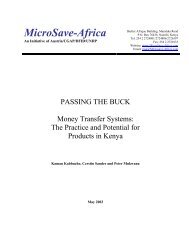You also want an ePaper? Increase the reach of your titles
YUMPU automatically turns print PDFs into web optimized ePapers that Google loves.
2<br />
On a quiet street in northwest Washington,<br />
Don Mickelwait sat on the steps <strong>of</strong> a<br />
townhouse, waiting and worrying. It was the<br />
summer <strong>of</strong> 1979 and half a world away a project<br />
team headed for war-torn Southern Sudan was<br />
stuck in Kenya without transportation. Mickelwait’s<br />
company had promised to mobilize the<br />
team quickly, proving its commitment to help the<br />
regional government with its rebuilding program,<br />
but now it looked as if that commitment might<br />
not be fulfilled. For nearly a decade, Mickelwait<br />
and a band <strong>of</strong> other “pragmatic idealists” had<br />
been traveling the world, acquiring new skills<br />
and knowledge, and making a living in a field<br />
that spoke to their values and challenged their<br />
intellects. They had created a small company,<br />
Development Alternatives, Inc. (<strong>DAI</strong>), whose<br />
mission was to make a difference in the world<br />
by improving the process <strong>of</strong> delivering economic<br />
development. <strong>DAI</strong> had only recently begun to<br />
take <strong>of</strong>f, but sitting on the steps that hot summer<br />
day, its president wondered if it was about<br />
to crash.<br />
A year earlier, a <strong>DAI</strong> team had helped the U.S.<br />
Agency for International Development (USAID)<br />
design a project to revitalize the agricultural<br />
economy <strong>of</strong> Southern Sudan after 17 <strong>years</strong> <strong>of</strong><br />
civil war. Christened the Sudan Agricultural Manpower<br />
Development Project (SMDP), the project<br />
would place technical advisors at three different<br />
training institutions and the regional ministry <strong>of</strong><br />
agriculture headquarters in Juba. This team not<br />
only needed vehicles suited to the very rough<br />
roads <strong>of</strong> Southern Sudan, but they would have<br />
to live in prefab housing, hauled overland by<br />
truck from Kenya, to be built by the contractor.<br />
It was a difficult job that <strong>DAI</strong> had competed for,<br />
successfully, but it required financial resources<br />
and know-how that seriously stretched a young<br />
company.<br />
Mickelwait had good reason to be worried. The<br />
contract with USAID called for <strong>DAI</strong> to buy eight<br />
Land Rovers—at a cost <strong>of</strong> $200,000—but that<br />
was much more money than the company had<br />
in its bank account. If they couldn’t pay for the<br />
vehicles to be delivered in Nairobi and driven<br />
to Juba, Mickelwait and his partners might lose<br />
the contract, or perhaps even the company.<br />
Several weeks earlier, <strong>DAI</strong> had submitted bills<br />
for other contracts to the government, but these<br />
hadn’t yet been paid. The Sudan project team<br />
was sending in daily telexes, each one grumpier<br />
than the last. This morning’s read much like an<br />
ultimatum: someone else will buy the Land Rovers<br />
if we can’t come up with the money. As he<br />
thought about Land Rovers, the problems waiting<br />
to be tackled in Southern Sudan, and the<br />
survival <strong>of</strong> the company, good fortune arrived<br />
in the form <strong>of</strong> a postman bearing a check from<br />
USAID paying the earlier invoices. “It saved us,”<br />
Mickelwait later recalled. The team in Nairobi<br />
got the keys to their vehicles, and the difficult<br />
work <strong>of</strong> implementing SMDP got started.



